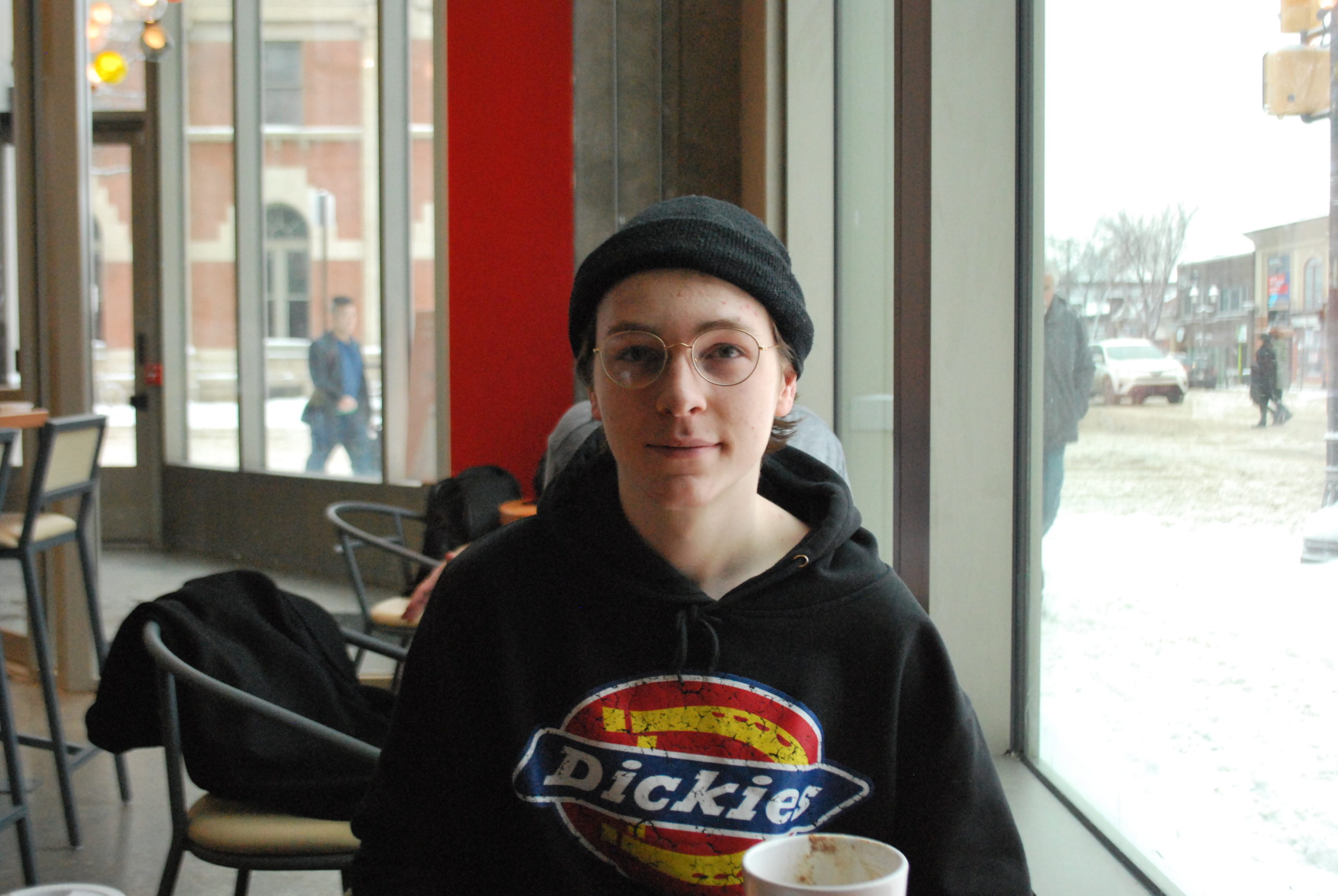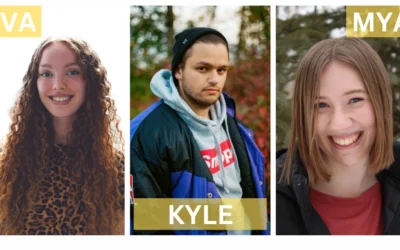At around 11 a.m. one day in December of last year, 19-year-old Edmontonian Brad Semotiuk was awoken by an odd phone call from internationally famous American stand-up comedian Steve Hofstetter.
“He kept asking me about the conversion rate between American and Canadian dollars,” Semotiuk says. “I was in such a daze and I had no idea what he was talking about. I had completely forgotten about the grant.”
Semotiuk, himself a comic in the nascent stages of a professional career, had several months earlier casually applied for the Martin Grant — set up by Hofstetter to award $10,000 USD to an up-and-coming comedian once per year — and had barely thought about it since.
“I had totally put it out of my mind because I honestly did not think I was going to win,” Semotiuk says. “I was the youngest to apply by a lot. I was the only one not from America. Eventually, I got it together and told him that 10,000 (USD) would work out to about 13,000 Canadian. He said, ‘well I guess you’re getting 13,000 then,’ and I just freaked out.”
Of the five recipients of the grant so far, Semotiuk is — just as he was among the pool of this year’s applicants — the youngest overall and the only Canadian. He’s also relatively new to performing, having first gotten up on stage just over two years ago as an underage high-school student. However, he has “been trying to make people laugh (his) whole life,” he says, recalling how he would get in trouble as the class clown as far back as elementary school.
“I’ve also always liked trying to make adults laugh, especially as a kid,” he says. “That was my big thing. As a 10-year-old, if I could make someone who was that much smarter than me laugh, that was a big accomplishment.”
Even the idea to try and turn his humour into a job came to him early, when he was 12 years old. At that time, whenever he and his mother went on a long drive, they would listen to audiobooks, until eventually they ran out of material and made the switch to stand-up CDs.
“She just picked up some old comedy albums at random, and I just fell in love with it,” Semotiuk says. The first one that really stood out to him was Jim Gaffigan’s Beyond the Pale, but “the one that made (him) actually want to start writing jokes,” was the late Mitch Hedberg’s Mitch All Together. What followed was a few years of carrying around a notebook in his hoodie’s pouch everywhere he went, frantically jotting down notes of anything he saw or thought of that was funny, trying out jokes on his friends, and only once getting up on a stage.
“I emcee’d the Remembrance Day ceremony at my junior high one year… I made a dumb joke about not remembering why I was there and it just completely bombed,” Semotiuk says. “That was my first ever bomb. I was in Grade 9.”

For the most part, his time was spent not very patiently awaiting the day he would be allowed onto the more appropriate stages in the usually 18-and-older comedy clubs or bars that would host a stand-up night. But, things lined up in his personal life such that he had a bunch of free time a year early, so he decided to do what any responsible high-schooler looking to get a head start in their career would do: get a fake ID.
“I think everyone knew, but just didn’t say anything because I wasn’t in there drinking. I was just there to tell jokes and then leaving right away,” he says.
Semotiuk has since settled into a comedic style in which the influence of Hedberg, who passed away in 2005 a couple of years after Mitch All Together was released, is apparent — mostly in that they both give a hilariously deadpan delivery of what amount to pretty straightforward observations of everyday situations (“It’s funny because it’s true,” is the old saying). They differ in a lot of the technical details like joke length — where Hedberg stuck to one and two-liners most of the time, Semotiuk opts for a more familiar short story-telling format — but more drastically in the subject matter. There is, after all, a gap between what constitutes “everyday situations” for him and Hedberg, who got his start just over 30 years ago.
Semotiuk’s sets are littered with subjects that will be familiar to his college-aged contemporaries — sexting, stick-and-poke tattoos, seeing a therapist — but absent of the old-man-yells-at- cloud vibe that often pervades the material of the currently popular cabal of 40-something comics (We all know the type: eager to deliver their barely distinct jokes that come across more as them just preaching awareness of the apparently global crises of avocado toast, safe spaces, etc.). If anything, Semotiuk sometimes faces the problem of being generationally removed from his audiences from the other direction. One adjustment to his act he has made since he started was to include material about himself being so young to help disarm the audience. “I was born in the year 2000. Does that make anyone mad?” he asks a crowd in a clip uploaded to his YouTube channel.
“It kind of came out of necessity,” he says. “I would get people heckling me about my age — calling me Harry Potter and stuff like that. I just started telling jokes about it to try and get them on my side right away.”
Age aside, Semotiuk has been racking up a ton of experience since he started. He has done several tours around Alberta, a couple of sets in New York in 2018 on a trip he gifted to himself as a graduation present, and performed at the Cleveland Comedy Festival a few months later where he was named Best of the Fest. While at home in Edmonton, he says he performs “one or two times a night.” He also hosts two shows. One called “No Material Night,” at the Grindstone Theatre on the first Friday of every month, which he describes as when he and his friends “throw (their) jokes in the garbage and make up new ones on the spot.” The other, “Coming up Comedy,” features a lineup of rising stars such as himself once a month at the Comic Strip, on irregular dates.
“It’s a lot of work, but it’s the best full-time job I could ask for,” he says. “Often I just sit around and think about farts all day.”
“It’s a lot of work, but it’s the best full-time job I could ask for. Often I just sit around and think about farts all day.”
— Brad Semotiuk
But Edmonton is not exactly known for its robust comedy scene. There is an obligatory Yuk Yuk’s and a handful of other dedicated comedy clubs, but a lot of Semotiuk’s time has been spent in coffee shops and bars that happen to have a stage, especially when he first started out.
“There’s this place on 109 (St.) called the Woodrack Café — that was my second set,” he recalls. “No one would be there for the show. There would just be people doing homework or there for a job interview and we would go up to tell jokes but nobody would listen. If you could squeeze a laugh out of that room, you knew your joke was amazing.”
And though this un-established atmosphere has its advantages — he says Edmonton has “the most communal scene of any city,” and that the weekly comedy show in the tiny basement of the Black Dog Freehouse is secretly, “one of the best shows in Canada” — the lack of industry is limiting and doesn’t always pay the bills.
“I’ve been real broke for real long,” he says.
After he found out he won the Martin Grant and came down from what he describes as “a breath of fresh air mixed with a panic attack,” Semotiuk laid out plans to leave the city. While many Albertan comedians’ next step is to head to a larger scene within the country, usually Vancouver or Toronto, Semotiuk is skipping ahead to the big one: New York City. He plans on spending half of the money just getting into the United States (“they haven’t exactly made it easier to get into that country”), and saving the rest to fall back on as a safety. But while he has a lot to look forward to in the next few years, one of the things he’s anticipating most, as he often seems to be, is just being a little older.
“Every once in a while I won’t joke about (my age), and every time I get heckled about it and it’s like, damn — still not there yet,” he says. “I’m praying for the day that I don’t have to tell those jokes every night.”





0 Comments